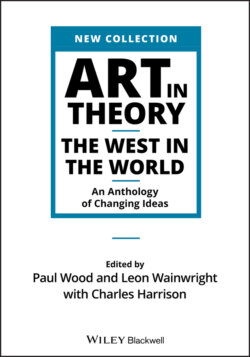Читать книгу Art in Theory - Группа авторов - Страница 109
Discourse 1
ОглавлениеWhen I was at sea last August, on my voyage to this country, which I had long and ardently desired to visit, I found one evening, on inspecting the observations of the day, that India lay before us, and Persia to our left, whilst a breeze from Arabia blew nearly on our stern. A situation so pleasing in itself, and to me so new, could not fail to awaken a train of reflections in a mind, which had early been accustomed to contemplate with delight the eventful histories and agreeable fictions of this eastern world. It gave me inexpressible pleasure to find myself in the midst of so noble an amphitheatre, almost encircled by the vast regions of Asia, which has ever been esteemed the nurse of sciences, the inventress of delightful and useful arts, the scene of glorious actions, fertile in the productions of human genius, abounding in natural wonders, and infinitely diversified in the forms of religion and government, in the laws, manners, customs, and languages, as well as in the features, and complexions, of men. I could not help remarking, how important and extensive a field was yet unexplored, and how many solid advantages unimproved; and when I considered, with pain, that, in this fluctuating, imperfect and limited condition of life, such inquiries and improvements could only be made by the united efforts of many, who are not easily brought, without some pressing inducement or strong impulse, to converge in a common point, I consoled myself with a hope, founded on opinions which it might have the appearance of flattery to mention, that, if in any country or community, such an union could be effected, it was among my countrymen in Bengal, with some of whom I already had, and with most was desirous of having, the pleasure of being intimately acquainted.
You have realised that hope, gentlemen, and even anticipated a declaration of my wishes, by your alacrity in laying the foundation of a society for inquiring into the history and antiquities, the natural productions, arts, sciences, and literature of Asia. […]
It is your design, I conceive, to take an ample space for your learned investigations, bounding them only by the geographical limits of Asia; so that, considering Hindustan as a centre, and turning your eyes in idea to the North, you have on your right, many important kingdoms in the Eastern peninsula, the ancient and wonderful empire of China with all her Tartarian dependencies, and that of Japan, with the cluster of precious islands, in which many singular curiosities have too long been concealed: before you lies that prodigious chain of mountains, which formerly perhaps were a barrier against the violence of the sea, and beyond them the very interesting country of Tibet, and the vast regions of Tartary … on your left are the beautiful and celebrated provinces of Iran or Persia, the unmeasured, and perhaps unmeasurable deserts of Arabia, and the once flourishing kingdom of Yemen, with the pleasant isles that the Arabs have subdued or colonized; and farther westward, the Asiatick dominions of the Turkish sultans, whose moon seems approaching rapidly to its wane. By this great circumference, the field of your useful researches will be inclosed; but, since Egypt had unquestionably an old connection with this country, if not with China since the language and literature of the Abyssinians bear a manifest affinity to those of Asia, since the Arabian arms prevailed along the African coast of the Mediterranean, and even erected a powerful dynasty on the continent of Europe, you may not be displeased occasionally to follow the streams of Asiatick learning a little beyond its natural boundary. […]
If it now be asked, what are the intended objects of our inquiries within these spacious limits, we answer, MAN and NATURE; whatever is performed by the one, or produced by the other. Human knowledge has been elegantly analysed according to the three great faculties of the mind, memory, reason, and imagination … hence the three main branches of learning are history, science, and art: the first comprehends either an account of natural productions, or the genuine records of empires and states; the second embraces the whole circle of pure and mixed mathematicks, together with ethicks and law, as far as they depend on the reasoning faculty; and the third includes all the beauties of imagery and the charms of invention, displayed in modulated language, or represented by colour, figure, or sound. […]
